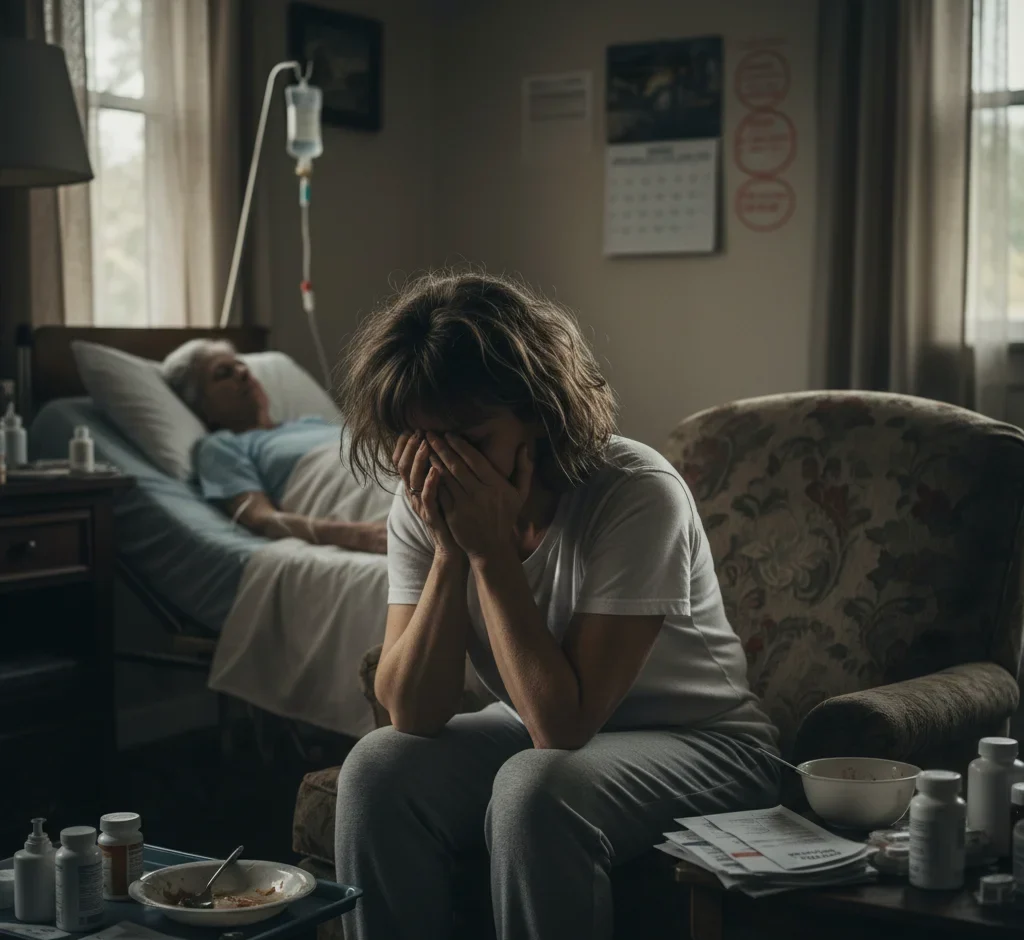
Gisela Ramos
More than 20 years of experience in Home Health Services
Need more Information about Respite Care?
Look at more of our blogs
Caregive burnout: How to identify it?
Feeling overwhelmed as a caregiver? You're not alone. Caregiver burnout...
Read MoreOur Services
Feeling Overwhelmed? Recognizing Caregiver Burnout and Finding Your Lifeline in Respite Care

To be a family caregiver is to perform one of the most profound acts of love. You are the steady hand, the familiar voice, the keeper of routines, and the fierce protector of a loved one's dignity. This role is often taken on without hesitation, fueled by devotion and a deep sense of responsibility. But what happens when the well of your own energy starts to run dry? What happens when the loving act of giving begins to take an unsustainable toll on your own health and happiness? This is the quiet, creeping reality of caregiver burnout, a state of emotional, mental, and physical exhaustion that can affect anyone in this demanding role. If you're reading this, you may already be familiar with the feeling. Please know you are not alone, and there is a supportive, sustainable path forward. This article is here to help you recognize the signs of burnout and to introduce a powerful solution: respite care.
The Unspoken Toll: What is Caregiver Burnout?
Caregiver burnout isn't just "feeling tired." It's a pervasive and serious condition brought on by the prolonged and intense stress of caring for someone with significant health needs. As detailed by leading institutions like the Cleveland Clinic and Johns Hopkins Medicine, it develops when you don't get the help you need, or if you try to do more than you are able—either physically or financially. This chronic stress can severely impact your health.
It's a gradual erosion of your own well-being. It starts with a little extra fatigue and can slowly morph into a state where you feel completely overwhelmed, emotionally drained, and unable to meet the constant demands of your role. Recognizing the specific symptoms is the first, most crucial step toward preventing a crisis.
The Four Pillars of Burnout: Recognizing the Symptoms
Burnout manifests across different areas of your life. See if any of these sound familiar:
1. Physical Exhaustion
- Chronic Fatigue: A bone-deep tiredness that sleep doesn't seem to fix.
- Changes in Sleep Patterns: Struggling with insomnia despite being exhausted, or wanting to sleep all the time.
- Lowered Immunity: Getting sick more often than usual with colds, the flu, or other infections.
- Physical Pain: Frequent headaches, back pain, or muscle aches that have no other clear cause.
- Changes in Appetite or Weight: Noticeable weight gain or loss without a change in diet.
2. Emotional Depletion
- Irritability and Anger: Feeling unusually short-tempered or resentful toward your loved one, other family members, or even yourself.
- Anxiety and Depression: Persistent feelings of worry, sadness, hopelessness, or dread.
- Mood Swings: Experiencing sudden and dramatic shifts in your emotional state.
- Loss of Interest: Feeling detached from hobbies and activities you once enjoyed.
3. Mental Fog (Cognitive Strain)
- Difficulty Concentrating: Finding it hard to focus on tasks or remember details.
- Constant Worry: An inability to "turn off" your brain, constantly running through a list of caregiving tasks and what-ifs.
- Pessimism: A negative or hopeless outlook on the future and your situation.
4. Social Isolation
- Withdrawing from Friends and Family: Turning down invitations or feeling like you don't have the time or energy for social contact.
- Feeling Alone: A sense that no one understands what you are going through, even when you're surrounded by people.
If this checklist resonates with you, it is not a sign of weakness or failure. It is a sign that you are a human being who has been giving an immense amount of yourself. It's a signal that your body and mind are asking for support.
A Story We See Every Day: Maria's Journey
Maria loved her father dearly. When his health declined after a stroke, she didn't hesitate to move him into her home. At first, it felt manageable. She would wake up early to administer his morning medications, prepare a special breakfast, and help him with his physical therapy exercises before starting her own remote work job. The evenings were filled with more medications, dinner, and getting him settled for the night.
But six months in, the routine became a relentless cycle. The joy she once felt in helping him was replaced by a constant, low-grade anxiety. Her work performance suffered as she was constantly interrupted. Calls from her friends went unanswered because she was just too tired to talk. One afternoon, her father, confused, accidentally knocked a full glass of water onto her laptop. Maria found herself snapping at him, her voice sharp with a frustration that immediately turned into a wave of guilt. Later that night, sitting alone in the quiet house, she realized she hadn't had a real, uninterrupted conversation with a friend or a moment to just read a book in months. She felt trapped, exhausted, and deeply alone. This was her breaking point—the moment she knew something had to change, not just for her, but for her father too.
Why You Can't Afford to Ignore the Signs
Ignoring caregiver burnout is like ignoring the check engine light in your car. You might be able to keep driving for a while, but eventually, a breakdown is inevitable. The consequences are serious and affect not only you but the very person you are dedicated to helping.
The Impact on You, the Caregiver:
Chronic stress is not just a state of mind; it has profound physiological effects. It can lead to high blood pressure, heart disease, a weakened immune system, and a higher risk of developing chronic illnesses. Mentally, untreated burnout can spiral into severe depression and anxiety disorders, requiring professional medical intervention. It can also strain your relationships with your spouse, children, and friends, and even jeopardize your career and financial stability if you're forced to reduce work hours or leave your job entirely.
The Impact on Your Loved One:
This is the hardest part to acknowledge, but it's crucial: when you are burned out, the quality of your care suffers. You may become less patient, less attentive, and more prone to making mistakes. Even with the best intentions, an exhausted caregiver cannot provide the same level of compassionate, focused care as one who is rested and supported. Your loved one can also pick up on your stress, which can cause them to feel like a burden, leading to their own feelings of guilt and depression. This creates a negative feedback loop where your stress affects them, and their subsequent distress further deepens your burnout.
True strength isn't about never needing a break; it's about knowing when to take one for the well-being of everyone.
The Proactive Solution: How Respite Care Restores Balance

For many caregivers like Maria, the thought of asking for help feels like an admission of defeat. It is not. Embracing respite care services is one of the strongest, most loving decisions you can make. It is a strategic choice to ensure you can continue providing the best care for your loved one in the long term.
What is respite care? In its simplest form, respite care is short-term relief for primary caregivers. It can be arranged for just a few hours, a full day, an overnight stay, or even for several weeks. The service is provided by trained, professional caregivers who can step in and seamlessly take over your duties, giving you a much-needed break to rest, recharge, and take care of your own life.
Overcoming the Barriers to Seeking Help
It's common to have reservations. Let's address them head-on:
- Guilt: "I should be able to do this all myself." Caregiving is a marathon, not a sprint. Elite athletes have support teams; caregivers deserve them too. Taking a break allows you to be a better caregiver when you return.
- Trust: "No one can care for them like I can." This is understandable. A professional respite care service in Orlando, like Light of Life, prioritizes finding a caregiver who is not only highly skilled but also a good personality match for your loved one. They follow your detailed care plan to the letter.
- Cost: "We can't afford it." Many families are surprised by the flexible and affordable options available. Think of it not as an expense, but as an investment in your own health and the long-term stability of your family's care plan.
5 Ways Respite Care Benefits Your Entire Family
The positive effects of respite care ripple outwards, creating a healthier environment for everyone involved.
1. Prevents Health Crises and Restores Your Well-being
A few hours of respite can allow you to do things that seem impossible right now: attend your own doctor's appointment, go for a walk, have lunch with a friend, or simply take a nap. This isn't an indulgence; it's essential maintenance for your physical and mental health. It allows your stress hormones to lower, your mind to clear, and your body to heal, protecting you from the serious health risks of chronic stress.
2. Enhances the Quality of Care for Your Loved One
When you return from a break feeling refreshed and recharged, you bring a renewed sense of patience, energy, and positivity to your caregiving role. You are more present, more attentive, and more able to provide the compassionate care your loved one deserves. You move from simply getting through the day to creating meaningful, positive interactions.
3. Strengthens Family Relationships
Burnout can breed resentment, especially if you feel that other family members aren't contributing enough. This strain can damage vital relationships. Respite care eases this tension by providing reliable support, reducing the burden on a single person and allowing family interactions to be about connection and love, rather than stress and obligation.
4. Provides Essential Socialization and Engagement
Respite care is a benefit for your loved one, too. A professional caregiver is a new, friendly face who can provide fresh conversation and different activities. This mental and social stimulation is incredibly valuable, helping to prevent feelings of isolation and depression in the person receiving care. It gives them a break from the same routine, which can be just as refreshing for them as it is for you.
5. Delivers Invaluable Peace of Mind
Perhaps the greatest benefit is the freedom from constant worry. Knowing that your loved one is in the hands of a trained, compassionate professional allows you to truly relax. You can run errands, go to work, or take a vacation with the confidence that their needs are being met safely and professionally. This peace of mind is priceless.
Frequently Asked Questions About Respite Care
How often should I use respite care?
There is no one-size-fits-all answer. It depends entirely on your needs. Some families use it for a few hours each week to run errands, while others schedule it for a full day to allow the caregiver to work or rest. Others might use it for a weekend or a full week to take a much-needed vacation. The key is to be proactive and schedule breaks before you reach a crisis point.
What qualifications do your caregivers have?
At Light of Life, all our caregivers are thoroughly vetted, background-checked, and professionally trained in areas such as CPR, first aid, and specific care needs for seniors and individuals with disabilities. We ensure they are not only skilled but also compassionate and reliable individuals.
How do you match a caregiver to our family?
We believe a successful match is about more than just skills; it's about personality. During our initial consultation, we take the time to understand your loved one's needs, interests, and temperament. We then match them with a caregiver who we believe will be a good fit, fostering a comfortable and positive relationship.
What if my loved one is resistant to the idea?
This is a common concern. We suggest introducing the idea gradually. Start by framing it as something for you ("I have an important appointment I can't miss, and I've asked a nice professional to stay with you"). You could also introduce the caregiver while you are still at home, allowing your loved one to build a rapport with them before you leave for the first time. Often, after one or two positive experiences, resistance fades.
Your Well-Being Matters. Let Us Help.
You have given so much of yourself. Now, it's time to give yourself the gift of support. Investing in respite care is an investment in your health, your family's stability, and the quality of life of the person you love. Don't wait for burnout to make the decision for you. Take the first step today.
Schedule a Free ConsultationGet in Touch With Us
Request a Free In Home Respite Care Consultation
Whether you’re exploring care options for a loved one or need help understanding our services, we’re here to guide you every step of the way.


